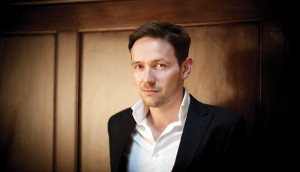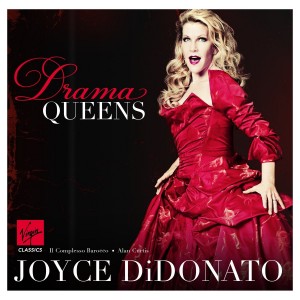Joyce DiDonato – Drama Queens
6th February, 2013 Barbican Hall
Il Complesso Barocco – Dmitry Sinkovsky
It has been a year for the stage queen – as I moved on from the drag queen of Simon Russell Beale in Privates on Parade to the drama queens carefully chosen by Joyce DiDonato.
Cesti ‘Intorno all’idol mio’ from Orontea
Scarlatti Sinfonia from Tolomeo ed Alessandro
Monteverdi ‘Disprezzata regina’ from L’Incoronazione di Poppea
Giacomelli ‘Sposa, son disprezzata’ from Merope
Vivaldi Concerto for violin and strings RV 242 “per Pisendel”
Orlandini ‘Da torbida procella’ from Berenice
Hasse ‘Morte col fiero aspetto’ from Antonio e Cleopatra
Handel ‘Piangerò la sorte mia’ from Giulio Cesare
Handel Passacaglia from Radamisto
Porta ‘Madre diletta, abbracciami’ from Ifigenia in Aulide
Gluck Ballet music from Armide
Handel ‘Brilla nell’alma’ from Alessandro
Joyce DiDonato has attracted quite a gay following of her own and quite deservedly it is a loyal and vocal one. DiDonato combines a quite knowing way withal with a quietly understated but quickly intelligent perception of the genre and the music she sings. She shares not just an effortless artistry – though there is plenty of that – not just a wonderful voice and formidable vocal technique – though she had both – but an infectious yet intellectual love of the music itself. she is a Diva who loves to give of her best but also loves her audience and laso seems to give a little more than just her best. you can tell I’m a fan. I have now heard her sing half a dozen or more times. She mesmerises and pleases equally. she is great on stage but honestly comes over as a great human being who just loves music. It is her life.
Later in May she sings La Donna del Lago here in london at the Royal Opera House. I think it will be a night to remember – one that will make history in its own way. she will become prima donna assoluta in the grand sense. her recent career has taken her steadily along a path as her command of character and vocal artistry have grown into something greater than the already considerable sum of their parts. Great stage performers are much alike Olympians – there comes a point where everything comes together and transforms performance into something new. It has happened with DiDonato. For those who come after, for those who love opera, DiDonato is now in that grand group great of post war singers that includes but isn’t limited to Marilyn Horne; Joan Sutherland; Shirley Verrett; Grace Bunbury; Leontyne Price; Montserrat Caballe; Renata Tebaldi; Elisabeth Söderström and Maria Callas.
Didonato’s programme was wide but some of it worked better than others: neither the Cesti nor the Monteverdi quite hit the needs of the big Barbican centre. I felt they would have been better suited to the Wigmore. Dmitry Sinkovsky however, set the hall alight both with the Scarlatti sinfonia and the vivaldi violin concerto. From then on didonato found her pace and range and grew aria by aria from strength to strength. Her account of Cleopatra’s aria from Handel’s Julio Cesare was a revelation.
I say this most solemnly: if you want to hear how early classical, classical and bel canto repertoire ought to be sung – with art, decoration and passion – you simply MUST go and hear Joyce diDonato.To miss her is to miss the point of life. I do not say this lightly. there are few times when a performer brings to life in live performance what you have only hear in recording or imagined in your head. In a single lifetime these moments come along only rarely – I urge you not to miss your chance.
Markus Werba baritone; Andreas Haefliger piano
Schubert, Wolf and Schumann
Monday 25th February
Markus Werba baritone & Andreas Haefliger piano
 His studies at the Klagenfurt Conservatory and Vienna’s Musikuniversität introduced baritone Markus Werba to the Austrian way of giving voice to words and communicating poetic texts through the medium of song.
His studies at the Klagenfurt Conservatory and Vienna’s Musikuniversität introduced baritone Markus Werba to the Austrian way of giving voice to words and communicating poetic texts through the medium of song.
His Lieder partner for this concert learned invaluable lessons about the art form at an early age from his father, the legendary Swiss tenor, Ernst Haefliger.
This lunchtime recital moves into the impassioned world of Schumann’s Dichterliebe by way of settings of masterful poetry by Goethe and Michelangelo.
Franz Schubert; Hugo Wolf;Robert Schumann
PROGRAMME
Schubert: Gesänge des Harfners I, II & III Wolf: Drei Gedichte von MichelangeloSchumann: Dichterliebe
This concert can be heard on BBC Radio 3 and BBC Iplayer. My comments will add nothing to Markus Werba’s dark, chocolate, smooth, velvet tone was giving voice this lunchtime to pure music. He carved out such perfect arcs of pure sound. Leider of all the classical forms requires vocal diminuendo which is not the same as singing quietly. This was song as felt for the first time – as if they were one with the poet’s pen as he first wrote words.
Wigmore Hall 27th February
Iestyn Davies countertenor; Richard Egarr harpsichord & Friends: Arise my muse
He is one of the newest stars in the firmament of countertenors a voice I have loved since I was a member of the school choir. Back then in the late 1960’s there were only rare recordings of the countertenor – mainly Alfred Deller. Deller’s version of Purcell’s Come Ye Sons of Art was one of my prized early LP’s. Purcell was writing birthday odes for Queen Mary II. James Bowman was the first to emerge into opera. He was Oberon in Britten’s great(est) stage work Midsummer Night’s Dream and Bowman also sings for me the definitive version of David’s lament over Jonathan from Act III of Handel’s fabulous oratorio Saul.
In this concert consummate countertenor Iestyn Davies followed slightly edgily I thought in the repertoire of the late Alfred Deller. If Dellar is godfather of British countertenors and a pioneer in the revival of this style of vocal music, Davies is his natural godson: like Dellar he is passionate about music from the Restoration period, when the timbre of six musicians gave a unique intensity and poignancy to the sound. Laments were in fashion partly because the instruments of joy could give them their perfect harmony.
The programme included Purcell’s Arise, my muse; If Music be the Food of Love; and Strike the Viol which was played faster than I’ve ever heard. Its dotted rhythms were strikingly revealed but I wasn’t wholly convinced about the pace.
Davies has become a star and like DiDonato he has a loyal following. He deserves both his star billing and his following. However, I find there can be a lack of soul in some of his concert interpretations. Sometimes the technique and beauty of the voice want something a little more deeply felt. He doesn’t allow himself completely to inhabit a role or submerge himself in the poet’s voice. Please do not take this as destructive crtiicism. Davies is great and will be yet greater but he has reached that moment in any artist’s career where he must take the dramatic plunge to make the music part of his soul as well as part of his glorious voice.
He has a delightful sweet shyness on stage but he needs to lose himself more completely in the music. It will come and like DiDonato when it comes what a difference there will be.

